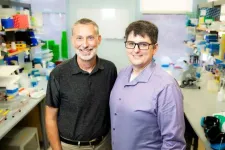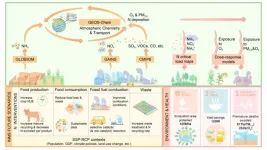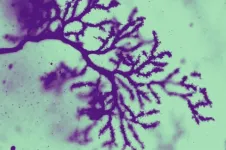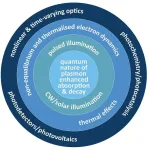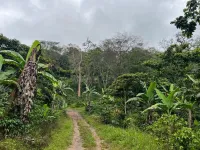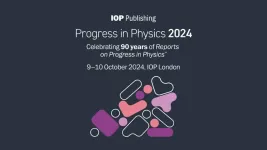(Press-News.org) Third-party collection of mail-in ballots has helped rural residents and those with disabilities to vote, yet the practice has become contentious and the target of laws aimed at restricting it.
Critics claim the process is vulnerable to fraud and manipulation.
But new research from the University of Utah’s College of Social & Behavioral Science tells a different story. Ballot collection is more accurately characterized as a pathway for legitimate voter participation, according to a study published last month. Authors Daniel McCool, a professor emeritus in the Department of Political Science, and Weston McCool, a postdoctoral researcher in the Department of Anthropology, debunk misconceptions about ballot collection and document its benefits.
“There is considerable controversy regarding the role of third-party ballot collection in elections,” said Daniel McCool, who has testified as an expert witness in Native American voting rights lawsuits. “Our results indicate that ballot collection is a valued service on Indian reservations, and there is no evidence that it leads to voter fraud.”
The research appears in the July edition of the American Indian Culture and Research Journal.
Focusing on Indian reservations in Montana and other Western states, the father-son team assessed the costs and benefits of ballot collection through a blend of qualitative and quantitative analyses. Native American communities often rely on ballot collection due to various socioeconomic and logistical challenges associated with casting votes.
Sometimes negatively referred to as “ballot harvesting,” ballot collection is the practice of someone other than the voter turning in completed ballots to a post office or ballot box. It has become popular with the rise of mail-in voting, which makes it much easier to vote, but not necessarily for Native Americans who often lack home mail service. Supervised by tribal governments and nonprofits such as Western Native Voice, ballot collectors on reservations deliver tribal members’ ballots to a post office or polling station that can be miles from their homes.
“They collected hundreds of ballots from Native Americans who live in very, very remote places,” McCool said. “The reason why these native voters were taking advantage of the ballot collection service was because it’s very difficult for them to overcome those long distances and the poor transportation.”
Legislatures in Utah and three other Western states have tried to ban the practice in recent years in a move that tribes have denounced as a partisan effort to limit Native Americans’ ability to vote and has led to lawsuits
Many states have adopted restrictions on who can collect another person’s ballot or how many one person can collect. Some forbid ballot collectors from accepting payment, which effectively bans third-party collecting on reservations, according to McCool.
Nineteen states allowed only the voter, a family member or a caregiver to turn in a ballot during the study’s time frame. Of these, four have substantial Native American populations: Arizona, Oklahoma, New Mexico and Nevada.
Utah has since banned ballot collection by third parties under an election reform law unanimously passed in 2020.
By examining trends in vote-by-mail programs, socioeconomic variables, distance to polling stations and mail locations, and U.S. Postal Service delivery efficiency on reservations, the McCools documented how ballot collection improves the voting experience of Native Americans.
Their findings illustrate how ballot collection reduces inequality in the cost of voting for Native Americans. On reservations, where access to polling places and reliable mail services can be limited, ballot collection ensures these community members can exercise their right to vote without undue burden.
The statistical analysis conducted by the McCools found no evidence to support allegations that ballot collection leads to voter fraud, deflating the argument commonly used to restrict ballot collection practices.
“The evidence is actually collected by the conservative think tank, the Heritage Foundation,” McCool said. “We use their data to indicate that there’s no voter fraud associated with ballot collection.
The foundation’s database documents 1,850 cases of proven voter fraud, which resulted in convictions, going back to 1980 for all elections surveyed, from president to dogcatcher.
“Political scientists calculated the frequency of voter fraud based on the Heritage Foundation data,” McCool said. “The frequency is .00006%.”
Another way to frame that figure is to say there were six cases of proven fraud for every 10 million votes cast in the United States.
“The problem is not voter fraud,” McCool said. “The problem is the fraud about voter fraud.”
END
Exposing myths about ballot collection on Native American reservations
Utah researchers find ballot collection lowers barriers to voting for Naive Americans, while resulting in no documented cases of vote fraud.
2024-08-16
ELSE PRESS RELEASES FROM THIS DATE:
New twist on synthesis technique developed at Rice promises sustainable manufacturing
2024-08-16
James Tour’s lab at Rice University has developed a new method known as flash-within-flash Joule heating (FWF) that could transform the synthesis of high-quality solid-state materials, offering a cleaner, faster and more sustainable manufacturing process. The findings were published in Nature Chemistry on Aug. 8.
Traditionally, synthesizing solid-state materials has been a time-consuming and energy-intensive process, often accompanied by the production of harmful byproducts. But FWF enables gram-scale production of diverse compounds in seconds while reducing energy, water consumption and greenhouse gas emissions by ...
Rare diseases point to connections between metabolism and immunity
2024-08-16
Inherited diseases of metabolism and immunity have more in common than previously recognized, according to a new study published in the journal Science Immunology. The findings point to a new set of metabolic genes that are important for the function of immune system T cells, and they offer insights that could improve care for patients with these disorders.
The study examined genes that cause inborn errors of metabolism (disorders of the processes that cells use to convert food to energy) and inborn errors of immunity (disorders that affect immune system function). These rare and complex diseases are not fully understood.
“There had previously ...
Nitrogen interventions as a key to better health and robust ecosystems
2024-08-16
The Earth’s nitrogen cycle is among the most heavily exceeded planetary boundaries. Agricultural production and fossil fuel burning release nitrogen pollutants like ammonia (NH3), nitrogen oxides (NOx), and nitrous oxide (N2O), which contribute to air pollution and damage ecosystems. These pollutants harm human health, crops, and ecosystems. Given the growing global energy and food demand, this damage is expected to increase even further.
The potential of nitrogen pollution mitigation technologies ...
Knocking out one key gene leads to autistic traits
2024-08-16
More than 70 genes have been linked to autism spectrum disorder (ASD), a developmental condition in which differences in the brain lead to a host of altered behaviors, including issues with language, social communication, hyperactivity, and repetitive movements. Scientists are attempting to tease out those specific associations gene by gene, neuron by neuron.
One such gene is Astrotactin 2 (ASTN2). In 2018, researchers from the Laboratory of Developmental Neurobiology at Rockefeller University discovered how defects in the protein produced by the gene disrupted ...
What does the EU's recent AI Act mean in practice?
2024-08-16
The European Union's law on artificial intelligence came into force on 1 August. The new AI Act essentially regulates what artificial intelligence can and cannot do in the EU. A team led by computer science professor Holger Hermanns from Saarland University and law professor Anne Lauber-Rönsberg from Dresden University of Technology has examined how the new legislation impacts the practical work of programmers. The results of their analysis will be published in the autumn.
'The AI Act shows ...
A visionary approach: How an Argonne team developed accessible maps for colorblind scientists
2024-08-16
Imagine having to do your job, but not being able to visually process the data right in front of you. Nearly eight percent of genetic males and half a percent of genetic females have some form of Color Vision Deficiency (CVD), or the decreased ability to discern between particular colors. CVD is commonly referred to as color blindness.
Scientists use colors to convey information. Many scientists in the weather radar community have CVD and the use and interpretation of color is an important aspect of their work. Most colormaps ...
Unveiling the power of hot carriers in plasmonic nanostructures
2024-08-16
A new scientific review explores the exciting potential of hot carriers, energetic electrons generated by light in plasmonic nanostructures. These tiny structures hold immense promise for future technologies due to their unique way of interacting with light and creating hot carriers.
Hot carriers are electrons with a surplus of energy. When light strikes a plasmonic nanostructure, it can excite these electrons, pushing them out of equilibrium. This non-equilibrium state unlocks a range of fascinating phenomena. Hot carriers can be used to control light itself, potentially leading to ...
New research shows agricultural impacts on soil microbiome and fungal communities
2024-08-16
New research from Smithsonian’s Bird Friendly Coffee program highlights a type of biodiversity that often gets overlooked: soil bacteria and fungal communities. For over twenty years, Smithsonian research has shown that coffee farms with shade trees protect more biodiversity than intensified, monoculture coffee farms. The new research, published today in Applied Soil Ecology, shows that soil bacteria and fungi on coffee farms also respond to the intensity of coffee farm management. To conduct this research, the team collected soils samples on coffee farms in Colombia, El Salvador, and Peru and used DNA analysis to profile bacterial and fungal soil on ...
Tracking down the asteroid that sealed the fate of the dinosaurs
2024-08-16
Geoscientists from the University of Cologne have led an international study to determine the origin of the huge piece of rock that hit the Earth around 66 million years ago and permanently changed the climate. The scientists analysed samples of the rock layer that marks the boundary between the Cretaceous and Paleogene periods. This period also saw the last major mass extinction event on Earth, in which around 70 percent of all animal species became extinct. The results of the study published in Science indicate that the asteroid formed outside Jupiter’s orbit during the ...
IOP Publishing hosts Progress In Physics 2024 – a two-day hybrid conference focused on condensed matter physics
2024-08-16
The Institute of Physics and IOP Publishing (IOPP) are launching Progress In Physics 2024, a two-day hybrid workshop hosted at the Institute of Physics’ office in London from 9-10 October 2024. The event will cover topics on condensed matter and will bring together leading physics researchers to exchange knowledge in both an in-person and online format.
Progress in Physics 2024 aligns with the mission of IOPP’s new Progress In seriesTM of journals. The series builds on the success of IOPP’s flagship journal Reports on Progress in PhysicsTM which celebrates its 90th anniversary this year.
With ...
LAST 30 PRESS RELEASES:
Barshop Institute to receive up to $38 million from ARPA-H, anchoring UT San Antonio as a national leader in aging and healthy longevity science
Anion-cation synergistic additives solve the "performance triangle" problem in zinc-iodine batteries
Ancient diets reveal surprising survival strategies in prehistoric Poland
Pre-pregnancy parental overweight/obesity linked to next generation’s heightened fatty liver disease risk
Obstructive sleep apnoea may cost UK + US economies billions in lost productivity
Guidelines set new playbook for pediatric clinical trial reporting
Adolescent cannabis use may follow the same pattern as alcohol use
Lifespan-extending treatments increase variation in age at time of death
From ancient myths to ‘Indo-manga’: Artists in the Global South are reframing the comic
Putting some ‘muscle’ into material design
House fires release harmful compounds into the air
Novel structural insights into Phytophthora effectors challenge long-held assumptions in plant pathology
Q&A: Researchers discuss potential solutions for the feedback loop affecting scientific publishing
A new ecological model highlights how fluctuating environments push microbes to work together
Chapman University researcher warns of structural risks at Grand Renaissance Dam putting property and lives in danger
Courtship is complicated, even in fruit flies
Columbia announces ARPA-H contract to advance science of healthy aging
New NYUAD study reveals hidden stress facing coral reef fish in the Arabian Gulf
36 months later: Distance learning in the wake of COVID-19
Blaming beavers for flood damage is bad policy and bad science, Concordia research shows
The new ‘forever’ contaminant? SFU study raises alarm on marine fiberglass pollution
Shorter early-life telomere length as a predictor of survival
Why do female caribou have antlers?
How studying yeast in the gut could lead to new, better drugs
Chemists thought phosphorus had shown all its cards. It surprised them with a new move
A feedback loop of rising submissions and overburdened peer reviewers threatens the peer review system of the scientific literature
Rediscovered music may never sound the same twice, according to new Surrey study
Ochsner Baton Rouge expands specialty physicians and providers at area clinics and O’Neal hospital
New strategies aim at HIV’s last strongholds
Ambitious climate policy ensures reduction of CO2 emissions
[Press-News.org] Exposing myths about ballot collection on Native American reservationsUtah researchers find ballot collection lowers barriers to voting for Naive Americans, while resulting in no documented cases of vote fraud.

